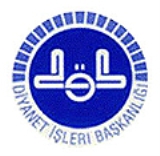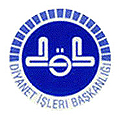
Diyanet Isleri Baskanligi
Encyclopedia

Turkey
Turkey , known officially as the Republic of Turkey , is a Eurasian country located in Western Asia and in East Thrace in Southeastern Europe...
, the Presidency of Religious Affairs is an official institution established in 1924 after the abolition of the caliphate
Caliphate
The term caliphate, "dominion of a caliph " , refers to the first system of government established in Islam and represented the political unity of the Muslim Ummah...
. Founded by the Grand National Assembly of Turkey
Grand National Assembly of Turkey
The Grand National Assembly of Turkey , usually referred to simply as the Meclis , is the unicameral Turkish legislature. It is the sole body given the legislative prerogatives by the Turkish Constitution. It was founded in Ankara on 23 April 1920 in the midst of the Turkish War of Independence...
as a successor to Sheikh ul-Islam
Sheikh ul-Islam
Shaykh al-Islām is a title of superior authority in the issues of Islam....
, it represents the highest Islam
Islam
Islam . The most common are and . : Arabic pronunciation varies regionally. The first vowel ranges from ~~. The second vowel ranges from ~~~...
ic religious authority in the country. It is normally referred to simply as the Diyanet.
As specified by law, the duties of the Diyanet are “to execute the works concerning the beliefs, worship, and ethics of Islam, enlighten the public about their religion, and administer the sacred worshipping places”.
The Diyanet had an allocated budget of 1,308,187,000 YTL
Turkish new lira
The new Turkish lira was the currency of Turkey and the de facto independent state of the Turkish Republic of Northern Cyprus between 1 January 2005 and 1 January 2009 which was a transition period for the removal of six zeroes from the currency. The new lira was subdivided into 100 new kurush...
or USD $0.9 Billion for the year 2006.
In 1984, the Diyanet İşleri Türk İslam Birliği
Diyanet Isleri Türk Islam Birligi
The Turkish-Islamic Union for Religious Affairs , is one of the largest Islamic organisations in Germany. It was founded in 1984 as a branch of the Presidency of Religious Affairs in Ankara. The headquarters are in Cologne-Ehrenfeld....
was opened in Germany
Germany
Germany , officially the Federal Republic of Germany , is a federal parliamentary republic in Europe. The country consists of 16 states while the capital and largest city is Berlin. Germany covers an area of 357,021 km2 and has a largely temperate seasonal climate...
to cater for the religious needs of the large Turkish minority there.
The Diyanet has made a name for itself by using the Quran and Hadith
Hadith
The term Hadīth is used to denote a saying or an act or tacit approval or criticism ascribed either validly or invalidly to the Islamic prophet Muhammad....
. A recent example is the permission of training women as preachers. In March 2005 two women were appointed as vice-mufti
Mufti
A mufti is a Sunni Islamic scholar who is an interpreter or expounder of Islamic law . In religious administrative terms, a mufti is roughly equivalent to a deacon to a Sunni population...
in Kayseri
Kayseri
Kayseri is a large and industrialized city in Central Anatolia, Turkey. It is the seat of Kayseri Province. The city of Kayseri, as defined by the boundaries of Kayseri Metropolitan Municipality, is structurally composed of five metropolitan districts, the two core districts of Kocasinan and...
and Istanbul
Istanbul
Istanbul , historically known as Byzantium and Constantinople , is the largest city of Turkey. Istanbul metropolitan province had 13.26 million people living in it as of December, 2010, which is 18% of Turkey's population and the 3rd largest metropolitan area in Europe after London and...
.
In 2006, Pope Benedict XVI travelled by car to the Diyanet, where he met with its then president, Ali Bardakoğlu
Ali Bardakoglu
Ali Bardakoğlu is the former president of Diyanet İşleri Başkanlığı and as such the highest Islamic authority in Turkey and the Turkish Republic of Northern Cyprus.-Background:...
, and with various Turkish Muslim leaders, among them the Grand Mufti of Ankara and the Grand Mufti of Istanbul. The Diyanet allows in vitro fertilization and birth control pills.
List of Presidents
The following people have presided the institution:- Mehmet Rifat Börekçi (1924-1941)
- Ord. Prof. Şerafettin Yaltkaya (1941-1947)
- Ahmet Hamdi Akseki (1947-1951)
- Eyüp Sabri Hayırlıoğlu (1951-1960)
- Ömer Nasuhi Bilmen (1960-1961)
- Hasan Hüsnü Erdem (1961-1964)
- Mehmet Tevfik Gerçeker (1964-1965)
- İbrahim Bedrettin Elmalılı (1965-1966)
- Ali Rıza Hakses (1966-1968)
- Lütfi Doğan (1968-1972)
- Dr. Lütfi Doğan (1972-1976)
- Prof. Dr. Süleyman Ateş (1976-1978)
- Dr. Tayyar Altıkulaç (1978-1986)
- Prof. Dr. Mustafa Sait YazıcıoğluMustafa Sait YaziciogluMustafa Sait Yazıcıoğlu is a minister of state of Turkey and deputy prime minister. He is a professor of religious studies.- Family, Education and Scientific Career :...
(1986-1992) - Mehmet Nuri Yılmaz (1992-2003)
- Ali BardakoğluAli BardakogluAli Bardakoğlu is the former president of Diyanet İşleri Başkanlığı and as such the highest Islamic authority in Turkey and the Turkish Republic of Northern Cyprus.-Background:...
(2003-2010) - Mehmet Görmez (2010-Present)
See also
- Islam in TurkeyIslam in TurkeyThe region secacomprising modern Turkey has a long and rich Islamic tradition stretching back to the dawn of the Seljuk period and Ottoman Empire. The country has many historical mosques present throughout the cities and towns, including many in Istanbul...
- Liberal movements within IslamLiberal movements within IslamProgressive Muslims have produced a considerable body of liberal thought within Islam or "progressive Islam" ; but some consider progressive Islam and liberal Islam as two distinct movements)...
- Women as imamsWomen as imamsThere is a current controversy among Muslims regarding the circumstances in which women may act as imams—that is, lead a congregation in salah...
- Shaikh al-Islam
- Indonesian Ulema CouncilIndonesian Ulema CouncilIndonesian Ulema Council is Indonesia's top Muslim clerical body. The council comprises all Indonesian Muslim groups including Nahdlatul Ulama , Muhammadiyah, and the more subtle name like Persis, Al Irsyad, Majelis Mujahidin Indonesia , Hizbut Tahrir Indonesia , Forum Ulama Umat Islam and the...
External links
- Official Web site
- Women issuing fatwas, Qantara
The Diyanet of Turkey and Its Activities in Eurasia After the Cold War
http://src-h.slav.hokudai.ac.jp/publictn/acta/28/06Korkut.pdf
Thomas W. Smith, Between Allah and Atatürk: Liberal Islam in Turkey,http://centauro.cmq.edu.mx/dav/libela/paginas/infoEspecial/pdfArticulosLaicidad/100101237.pdf
KIMITAKA MATSUZATO & FUMIKO SAWAE, Rebuilding a Confessional State: Islamic Ecclesiology in
Turkey, Russia and China, Religion, State & Society, Vol. 38, No. 4, December 2010.http://www.tandfonline.com/doi/pdf/10.1080/09637494.2010.525318
İştar Gözaydın,Religion as Soft Power in the International Relations of Turkey,http://www.ispionline.it/it/documents/Religioni/Gozaydin_Religion%20as%20Soft%20Power%20in%20the%20International%20Relations%20of%20Turkey.pdf

